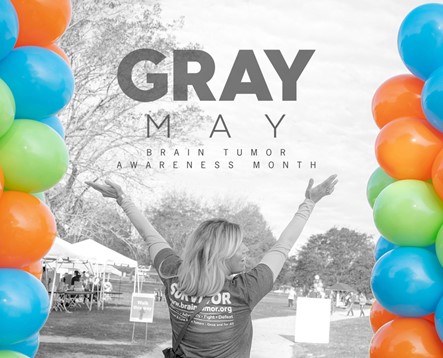It’s estimated that 700,000 Americans are currently living with a brain tumor, and nearly 85,000 more will be diagnosed in 2021, according to the National Brain Tumor Society (NBTS). Although brain tumors might not be the most prevalent type of cancer, it is among the deadliest. Following diagnosis, the five-year relative survival rate for individuals living with a malignant brain tumor is just 36% per the latest statistics from NBTS.
To increase public awareness of this issue and to provide further support to those affected by the disease, May was declared Brain Tumor (or Cancer) Awareness Month in 2004 by several nonprofits focused on making progress in this space and improving the lives of people with brain tumors.
Whether you or someone you know is living with a brain tumor, or you simply wish to learn more about the issue, here are three ways to learn more about brain tumors, recognize those living with a brain tumor, and thank the medical professionals and countless caregivers providing treatment and support:
- Know the warning signs of a brain tumor: There are more than 120 different types of brain tumors and symptoms can vary from person to person. According to Cleveland Clinic, it’s recommended you see a medical professional if you are experiencing:
- Seizures
- Changes in your mental state
- Personality or behavioral changes
- Clumsiness
- Visual problem
- Limb weakness
- Headaches
You should also be evaluated for brain metastases, or the spread of cancer to the brain from other parts of the body, if you’ve been previously diagnosed for lung, breast, skin, kidney, colon or other cancers.
- Support life-saving research and organizations: Here are three organizations dedicated to driving progress against cancer through fundraisers, giving, advocacy, and volunteer opportunities:
- American Brain Tumor Association was “the first national advocacy organization committed to funding brain tumor research and providing information and education to patients, caregivers, and their loved ones.”
- National Brain Tumor Society “unrelentingly invests in, mobilizes, and unites our community to discover a cure, deliver effective treatments, and advocate for patients and care partners.”
- American Association for Cancer Research is “the first and largest cancer research organization dedicated to accelerating the conquest of cancer.”
- Spread awareness and “Go Gray in May”: Finding out you or someone you love is diagnosed with brain cancer is a scary thing, and can make you feel isolated. This movement with the hashtag #GoGray is a way for both patients and their support systems to find vital health and treatment information and is also a public declaration that no one is truly alone.
- Ask your doctor about all treatment options: A brain tumor diagnosis can be overwhelming, especially when it’s followed by research, various treatment options, and many emotions. That’s why GT Medical Technologies created the GammaTile Therapy Patient Navigator Program. A GammaTile Patient Navigator is someone who has received GammaTile Therapy, a safe and effective Surgically Targeted Radiation Therapy (StaRT) for operable brain tumors, and wants to help others on their treatment journey. Your Navigator is there to help guide you, answer questions about their experience, provide reassurance and offer other resources and support.




